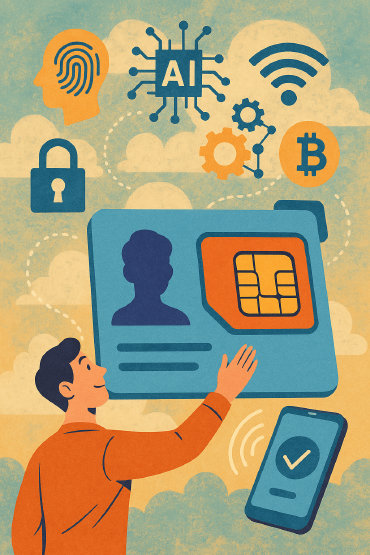Digital Identity and Security Crisis: Lessons from the 2025 SK Telecom SIM Card Hacking Incident
Warning of the 2025 SK Telecom SIM Card Hacking Incident
The SK Telecom SIM card hacking incident that occurred in 2025 left a painful warning for us living in the digital age. This incident went beyond simple personal information leakage, revealing the fundamental vulnerabilities of modern society that is deeply reliant on digital technologies such as artificial intelligence, the Internet of Things (IoT), mobile payments, and cryptocurrency trading. In an era where technology has become synonymous with life, this incident will be recorded as a stark example of how easily our identity and privacy can be threatened.
The Importance of SIM Cards and the Risks of Data Leakage
The SIM card is a key medium for verifying an individual's identity in the modern digital environment. It contains essential information that defines a person's digital existence, including the International Mobile Subscriber Identity (IMSI), the International Mobile Equipment Identity (IMEI), and authentication keys. If this information is leaked, it can lead to the possibility of identity manipulation or reconstruction, resulting in serious social repercussions such as financial fraud, location tracking, and data forgery. Ultimately, this leads to issues that undermine the trust foundation of the entire digital society.
Threats of Digitalized Life and Mode of Existence
Furthermore, such technological threats raise fundamental questions about the very way we 'exist,' beyond just security issues. Now that almost every aspect of life, including financial transactions, medical information, public services, and social media activities, has been digitized, the moment security collapses, we face a reality where our autonomy and privacy, and thus human dignity itself, are under threat. In today's transition from the era of physical identification to a digital identity-centered age, digital identity is emerging as an issue of personal sovereignty.
Technical and Institutional Response Strategies
In order to respond to these threats, a comprehensive strategy is needed at the technical, institutional, and sociocultural levels. Technically, strong encryption, multi-factor authentication, biometric recognition, and AI-based anomaly detection systems are essential. Additionally, strict identity verification procedures should be established during SIM card replacement, and institutional measures should be taken to establish security guidelines during the purchasing and registration processes.
Personal Security Habits and Social Culture
On a personal level, regular password changes, enabling two-factor authentication, and avoiding suspicious messages are important basic security habits. However, this is not just an individual effort it requires society as a whole to build a culture of personal data protection together. By promoting digital citizenship through education and media, a culture where all users voluntarily adhere to security guidelines must be established for technological defenses to achieve practical effectiveness.
Future-oriented digital society
The future digital society requires a more proactive, future-oriented approach beyond merely reacting passively to threats. Advanced AI, blockchain, and decentralized identity (DID) technologies can serve as new alternatives. In particular, blockchain-based identity authentication enables user-centric data control and is highly resistant to hacking and information leaks. This opens up the possibility of building decentralized platforms where individuals can manage their own digital existence, moving away from centralized information storage methods.
Preventing Hacking through AI and Big Data
At the same time, the advancement of artificial intelligence and big data analysis technology enables the establishment of a system that can detect signs of hacking in real-time and respond quickly. Institutionally, it is essential to establish clear accountability for damages and a compensation system, as well as close cooperation among investigative agencies, financial institutions, and information security authorities.
The Necessity of Socio-Cultural Reflection
Equally important as the advancement of technology is sociocultural reflection. A sense of responsibility regarding digital ethics and data sovereignty must be widely shared, and society should move toward recognizing users' rights and responsibilities to protect their own identities. It is crucial for educational institutions, businesses, and governments to collectively acknowledge the importance of digital identity and to establish practical standards in everyday life to protect it.
Structure of Humans Controlling Technology
Ultimately, in order to prevent technological advancements from threatening humanity, a structure must be established in which humans control technology. The security issues of the digital age also pose the question of how to uphold the inherent human values of freedom, autonomy, and dignity.
Conclusion: Designing the Future of the Digital Society
In conclusion, the SIM card hacking incident serves as a warning about the structural flaws in the digital ecosystem while also raising fundamental questions about what kind of digital society we want to create. Only when we can design a human-centered digital future through a harmonious combination of technology, institutions, and culture, will a safe and sustainable society become possible. At the core of this must always lie human dignity, freedom, and responsibility.

Post a Comment